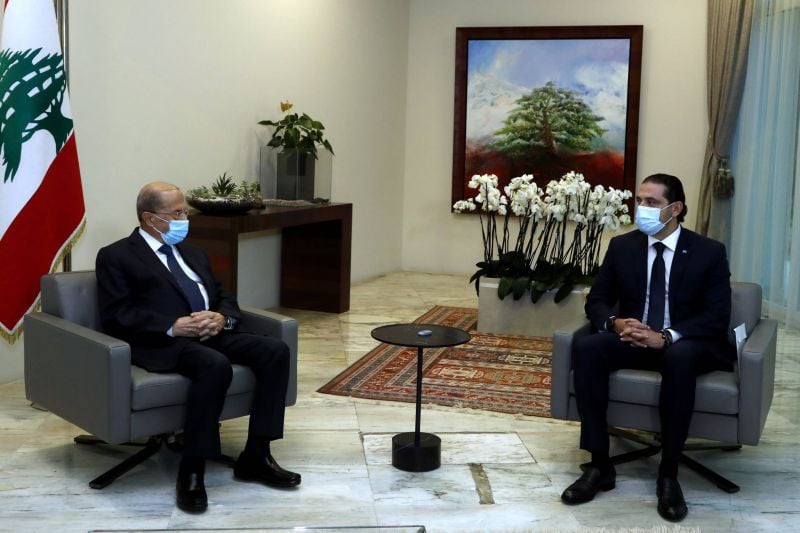
Amid protracted cabinet formation negotiations, President Michel Aoun and Premier-designate Saad Hariri meet at the Presidential Palace on March 22, 2021. (Credit: Dalati & Nohra)
BEIRUT — Despite seasoned US diplomat David Hale’s latest round of discussions with Lebanese leaders, the country’s protracted government crisis is only expected to intensify as leaders dig their heels in, experts warn.
Local political players of all stripes have proven unable to form a government more than eight months since the massive port explosion shook Beirut, killing over 200 people and forcing Prime Minister Hassan Diab to step down.
More than two months after the blast, former Premier Saad Hariri secured enough votes from Parliament to head what would be his fourth government, driving a wedge between Hezbollah and the Free Patriotic Movement, which withheld its support. Hezbollah, which also did not vote for Hariri, had nevertheless been seen as among the more enthusiastic for his return since his last resignation on Oct. 29, 2019.
A staunch ally of the FPM, Hezbollah has found itself in a delicate spot as it threads the needle between President Michel Aoun, the FPM’s founder, and Hariri.
This, analysts say, complicates the formation of the government, with each party maneuvering based on its own agenda.
“The crisis stems from both conflicting domestic and regional calculations that are intertwined,” Rosana Bou Monsef, a political analyst and veteran columnist for An-Nahar, told L’Orient Today.
One on hand, the Free Patriotic Movement, tentatively backed by Hezbollah, is trying to secure favorable terms in the upcoming government, which it expects to stay in power until after Aoun leaves office next year, she said.
This assumes that parliamentary elections, scheduled for 2022, are delayed — a probable scenario given local political sentiment, she said. A favorable cabinet could indirectly help Aoun’s son-in-law Gebran Bassil in his bid for the presidency, and if a presidential void ensues anyway, then holding sway over the government becomes all the more important.
On the other hand, Hariri is vying to put in place a government that can attract international and regional support to revitalize Lebanon’s ailing economy while chipping away at the FPM’s leverage.
“The FPM’s camp would rather continue with Hassan Diab’s resigned cabinet than concede to Hariri,” Bou Monsef said, adding that concessions would impact its influence and authority.
The FPM has accused Hariri of attempting to dictate Christian ministers, labeling the move as an attack on Lebanon’s power-sharing system.
Both the president and prime minister must mutually agree on the government, split equally between Christians and Muslims.
Meanwhile, Hariri has castigated the party for allegedly seeking over a third of the ministers — effective veto power.
“Even without a third of the ministers, the FPM, along with Hezbollah and the Amal Movement to a lesser extent, can control the government,” Bou Monsef added.
While the FPM, Hezbollah and the Amal Movement are typically grouped together as the main parties of the March 8 alliance, relations between the FPM and Amal are fraught.
Hezbollah, for its part, has managed to shield itself from being squarely blamed for the government crisis, while awaiting a potential rapprochement between the US and Iran that could reflect positively on Lebanon, according to Bou Monsef.
This sentiment was echoed by Mark Daou, a founding member of Taqaddom, a small democratic progressive party, who noted Hezbollah’s unwillingness to play an active role in facilitating the formation of the government while being content with sitting on the sidelines instead.
“It is not a priority for them as they are linking it to regional factors,” Daou said, adding that Hezbollah is “looking to use the government formation deadlock to serve its regional agenda.”
Hariri, meanwhile, is cognizant of the fact that a government that falls short of meeting international demands will fail to attract foreign aid, Bou Monsef said. “For this reason, Hariri also has no incentive to concede,” she added.
The international community has long pleaded for a government made up of independent experts, able to implement deep-cutting reforms that would theoretically set Lebanon on the road to recovery.
This was reiterated by Hale, who during his two-day trip to Beirut called for a government that can implement reforms required by foreign donors to unlock financial support.
Yet Bou Monsef argued that the current tug of war is aimed at pushing the international community to accept less than what it is demanding as Lebanon reaches uncharted territory.
“As the collapse accelerates, foreign leaders might accept certain concessions and amend conditions in terms of the cabinet’s makeup to calm the situation,” she said.
This was reflected in Hale’s latest comments, which stopped short of echoing France’s previous demands of an “independent” government.
Hale had urged Lebanese leaders to “show sufficient flexibility to form a government,” as the country looks set to pass another threshold next Thursday, exceeding the 254-day cabinet void that occurred after the 2018 elections.
However, the international community handing the current political class a lifeline seems far-fetched, Ziad El Sayegh, a public policy expert, told L’Orient Today.
“Hale’s language, coupled with that of other foreign leaders, indicates that no help will be given,” he said.
Sayegh also pointed to the “increased contradictions and bickering between local players,” who, he argued, have seemingly decided to solidify their positions, all at the expense of the country’s well-being.